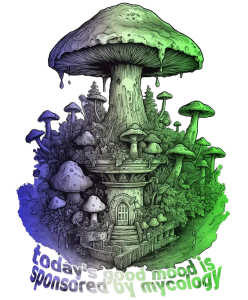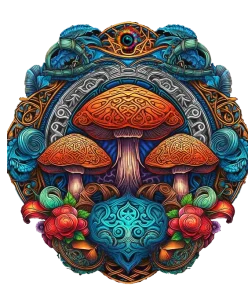Depression affects millions of people worldwide and remains one of the most difficult mental health conditions to treat. While traditional treatments, such as antidepressants and psychotherapy, provide relief for many, a significant percentage of individuals with depression do not respond to these conventional approaches. This is known as treatment-resistant depression, and for these individuals, hope can feel elusive. However, new research is shining a light on a potential breakthrough: psilocybin, the active compound found in magic mushrooms, is being explored as a powerful tool to combat depression. Could this ancient psychedelic hold the key to treating even the most severe and resistant cases?
What Is Psilocybin?
Psilocybin is a naturally occurring psychedelic compound found in certain species of mushrooms. When ingested, psilocybin is metabolized into psilocin, which then interacts with serotonin receptors in the brain, particularly the 5-HT2A receptor. This interaction results in altered perception, cognition, and mood. Historically, psilocybin has been used for centuries in various cultures for religious and healing rituals. However, in recent years, it has garnered attention in the scientific community for its potential therapeutic benefits, especially in treating mental health conditions like depression, anxiety, and PTSD.
Why Depression Is So Hard to Treat
Depression is not a one-size-fits-all condition. Its causes can be complex, ranging from genetic predispositions and biochemical imbalances to environmental factors and personal trauma. As a result, treating depression often requires a multifaceted approach. Antidepressants like selective serotonin reuptake inhibitors (SSRIs) are typically the first line of treatment, but they don’t work for everyone. In fact, research shows that up to 30% of people with depression do not respond to conventional treatments, leaving them searching for alternatives.
For those suffering from treatment-resistant depression, the condition can feel particularly devastating. These individuals often cycle through multiple medications and therapies with little to no relief. This is where psilocybin comes in, offering a potential new pathway to healing by targeting the brain in a way that traditional treatments do not.
How Psilocybin Works in the Brain
The way psilocybin affects the brain is both fascinating and complex. As mentioned earlier, psilocybin interacts with serotonin receptors, specifically the 5-HT2A receptor. This receptor plays a key role in mood regulation, cognition, and perception. When psilocybin binds to these receptors, it triggers a cascade of neurochemical reactions that lead to a profound shift in consciousness and emotional processing.
One of the most important effects of psilocybin on the brain is its ability to increase neuroplasticity. Neuroplasticity refers to the brain’s capacity to reorganize itself by forming new neural connections. This is particularly relevant for individuals with depression, as depression is often associated with rigid, negative thought patterns and reduced neural flexibility. By enhancing neuroplasticity, psilocybin may help “reset” the brain, allowing individuals to break free from these ingrained patterns and adopt more positive, adaptive ways of thinking.
Clinical Research on Psilocybin and Depression
In recent years, a growing body of research has demonstrated the potential of psilocybin to treat depression, particularly in cases that have not responded to other treatments. Some of the most promising studies have been conducted by institutions like Johns Hopkins University and Imperial College London, both of which have pioneered research into the therapeutic effects of psychedelics.
One groundbreaking study, published in The New England Journal of Medicine, compared psilocybin therapy to a commonly prescribed antidepressant, escitalopram. The study found that individuals who received psilocybin-assisted therapy showed significantly greater reductions in depressive symptoms compared to those who received escitalopram. Notably, the effects of psilocybin were both rapid and sustained, with many participants reporting improvements in their mood and overall well-being after just one or two sessions.
Another study, published by researchers at Imperial College London, investigated the effects of psilocybin on individuals with treatment-resistant depression. The results were striking: 67% of participants experienced a reduction in depressive symptoms one week after treatment, and nearly half remained in remission three months later. These results are particularly significant given the challenges of treating depression in individuals who have not responded to other therapies.
The Psilocybin Experience: What Happens During Therapy
Psilocybin therapy is not like traditional antidepressant treatment, where a pill is taken daily for weeks or months. Instead, psilocybin is typically administered in the context of a structured therapeutic session. These sessions take place in a controlled, safe environment, often with a trained therapist present to guide the individual through the experience.
Before the psilocybin session begins, patients undergo preparatory meetings with their therapist to establish trust, set intentions for the session, and discuss what to expect. During the session, the patient takes a controlled dose of psilocybin, often lying down with eyeshades and listening to soothing music to facilitate introspection.
The psilocybin experience itself can be deeply emotional and transformative. Many individuals report experiencing vivid visual and emotional imagery, revisiting past memories, and gaining new perspectives on their lives and mental health. Importantly, psilocybin allows individuals to confront their emotions and traumas in a way that feels less overwhelming or frightening. This sense of safety and emotional openness is key to the therapeutic process.
After the session, patients participate in integration meetings with their therapist to process the experience and apply the insights gained to their daily lives. This integration phase is crucial for ensuring that the benefits of the psilocybin session are long-lasting and meaningful.
Why Psilocybin Works for Treatment-Resistant Depression
One of the reasons psilocybin may be so effective for treatment-resistant depression is that it targets the brain in a different way than traditional antidepressants. While SSRIs work by gradually increasing serotonin levels over time, psilocybin induces an immediate, profound shift in consciousness that can lead to rapid improvements in mood and cognition.
Moreover, psilocybin’s ability to increase neuroplasticity may help individuals break free from the rigid, negative thought patterns that often characterize treatment-resistant depression. By “resetting” the brain, psilocybin allows individuals to adopt new ways of thinking and processing emotions, which can lead to long-lasting improvements in their mental health.
Another factor that sets psilocybin apart from traditional antidepressants is its ability to facilitate emotional breakthroughs. Many individuals with depression feel disconnected from their emotions or unable to access the root causes of their distress. Psilocybin helps break down these emotional barriers, allowing individuals to confront and process their emotions in a meaningful way. This emotional processing is often described as cathartic and can lead to a sense of emotional release and relief.
Risks and Ethical Considerations
While psilocybin therapy shows great promise, it is important to acknowledge the risks and ethical considerations associated with its use. Psilocybin is a powerful psychedelic, and its effects can be unpredictable, especially in uncontrolled settings. For this reason, psilocybin therapy should always be administered in a controlled, clinical environment with trained professionals.
There is also the potential for adverse psychological reactions, such as anxiety or paranoia, particularly in individuals with a history of mental health conditions like schizophrenia or bipolar disorder. These risks underscore the importance of careful screening and supervision during psilocybin therapy.
Another ethical consideration is the potential for misuse. As psilocybin becomes more widely known for its therapeutic potential, there is concern that individuals may attempt to self-medicate with psilocybin outside of a clinical setting. This could lead to dangerous situations, as unregulated doses and settings increase the risk of negative outcomes.
The Future of Psilocybin in Mental Health Treatment
As research into psilocybin continues to grow, there is hope that it will eventually become a mainstream treatment option for individuals with depression, particularly those with treatment-resistant cases. Several countries, including Canada and parts of the United States, have already decriminalized or legalized psilocybin for medical use, paving the way for more widespread access to this promising treatment.
However, there are still many hurdles to overcome. Regulatory approval is a lengthy and complex process, and there is still a great deal of stigma surrounding the use of psychedelics in mental health treatment. Moreover, while the early results from clinical trials are promising, more research is needed to fully understand the long-term effects of psilocybin therapy and to determine the best practices for its use.
That said, the potential benefits of psilocybin therapy are hard to ignore. For individuals with treatment-resistant depression, psilocybin offers a new pathway to healing, one that is fundamentally different from the treatments that have come before. As research continues to unfold, psilocybin may well become a cornerstone of future mental health treatments, offering hope to those who have long been without it.
Conclusion
Psilocybin represents a new frontier in the treatment of depression, particularly for those who have not found relief through traditional methods. With its unique ability to increase neuroplasticity, facilitate emotional breakthroughs, and offer rapid, sustained improvements in mood, psilocybin therapy holds tremendous promise for individuals with treatment-resistant depression. While more research is needed to fully understand its potential, the early results are highly encouraging, and psilocybin may soon become a transformative tool in the fight against depression


